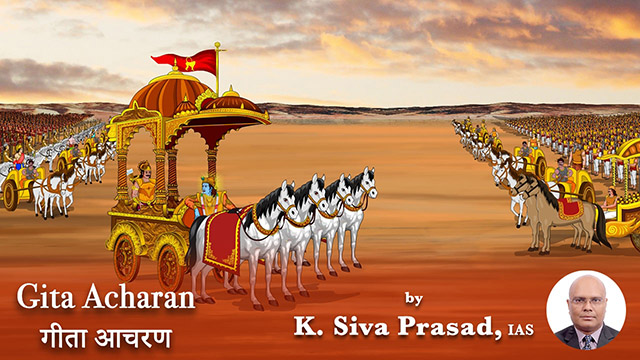
Krishna explained about the three 𝙜𝙪𝙣𝙖𝙨 or characteristics of nature viz. 𝙎𝙖𝙩𝙫𝙖, 𝙍𝙖𝙟𝙤 and 𝙏𝙖𝙢𝙤 on various occasions in the Bhagavad Gita. He declares that no living being on earth or the higher celestial abodes of this material realm is free from the influence of these three 𝙜𝙪𝙣𝙖𝙨 (18.40). This implies that at any given point of time we are under the influence of one 𝙜𝙪𝙣𝙖 or another.
Krishna cautioned (3.27-3.29) that 𝙠𝙖𝙧𝙢𝙖𝙨 (actions) in all situations are performed by the 𝙜𝙪𝙣𝙖𝙨; one who is deluded by 𝙖𝙝𝙖𝙣𝙠𝙖𝙖𝙧 thinks 'I am 𝙠𝙖𝙧𝙩𝙝𝙖 (doer)'. One who knows that 𝙜𝙪𝙣𝙖𝙨 interact with 𝙜𝙪𝙣𝙖𝙨 is not attached. 𝙂𝙪𝙣𝙖𝙨 have the ability to hypnotize us and under their influence we are attached to the functions of 𝙜𝙪𝙣𝙖𝙨. In chapters seventeen and eighteen, some functions of 𝙜𝙪𝙣𝙖𝙨 like worship, food, 𝙮𝙖𝙜𝙣𝙖, 𝙩𝙖𝙥𝙖𝙝 (of body, speech and mind), 𝙙𝙖𝙖𝙣 (charity), knowledge, 𝙠𝙖𝙧𝙢𝙖, 𝙠𝙖𝙧𝙩𝙝𝙖, intellect, 𝙙𝙝𝙧𝙪𝙩𝙞 (fortitude) and happiness, were explained.
Krishna gave a way forward and encouraged us to transcend these 𝙜𝙪𝙣𝙖𝙨 to be 𝙜𝙪𝙣𝙖-𝙖𝙩𝙚𝙚𝙩𝙝 who are alike in happiness and distress; who are established in the self; remain the same amidst pleasant and unpleasant events; accept both criticism and praise with equanimity; remain the same in respect and insult; treat both friend and foe alike; and abandon all delusions of 𝙠𝙖𝙧𝙩𝙖 (14.24-14.25).
While the nature of 𝙠𝙖𝙧𝙩𝙖 depends on the 𝙜𝙪𝙣𝙖 under whose influence the 𝙠𝙖𝙧𝙩𝙖 is at a given point of time, Krishna explained that the 𝙜𝙪𝙣𝙖-𝙖𝙩𝙚𝙚𝙩𝙝 abandons the delusion of 𝙠𝙖𝙧𝙩𝙖 altogether. Similarly, in the context of 𝙨𝙪𝙠𝙝 (happiness), the types of happiness vary depending on the 𝙜𝙪𝙣𝙖. But for a 𝙜𝙪𝙣𝙖-𝙖𝙩𝙚𝙚𝙩𝙝, there is no preference for a particular 𝙨𝙪𝙠𝙝 nor resistance to any 𝙙𝙪𝙠𝙝. In a nutshell, it is realising that life is an interplay of 𝙜𝙪𝙣𝙖𝙨.
https://epaper.dailyworld.in/Details.aspx?id=147664&boxid=78064&uid=&dat=2024-10-20

